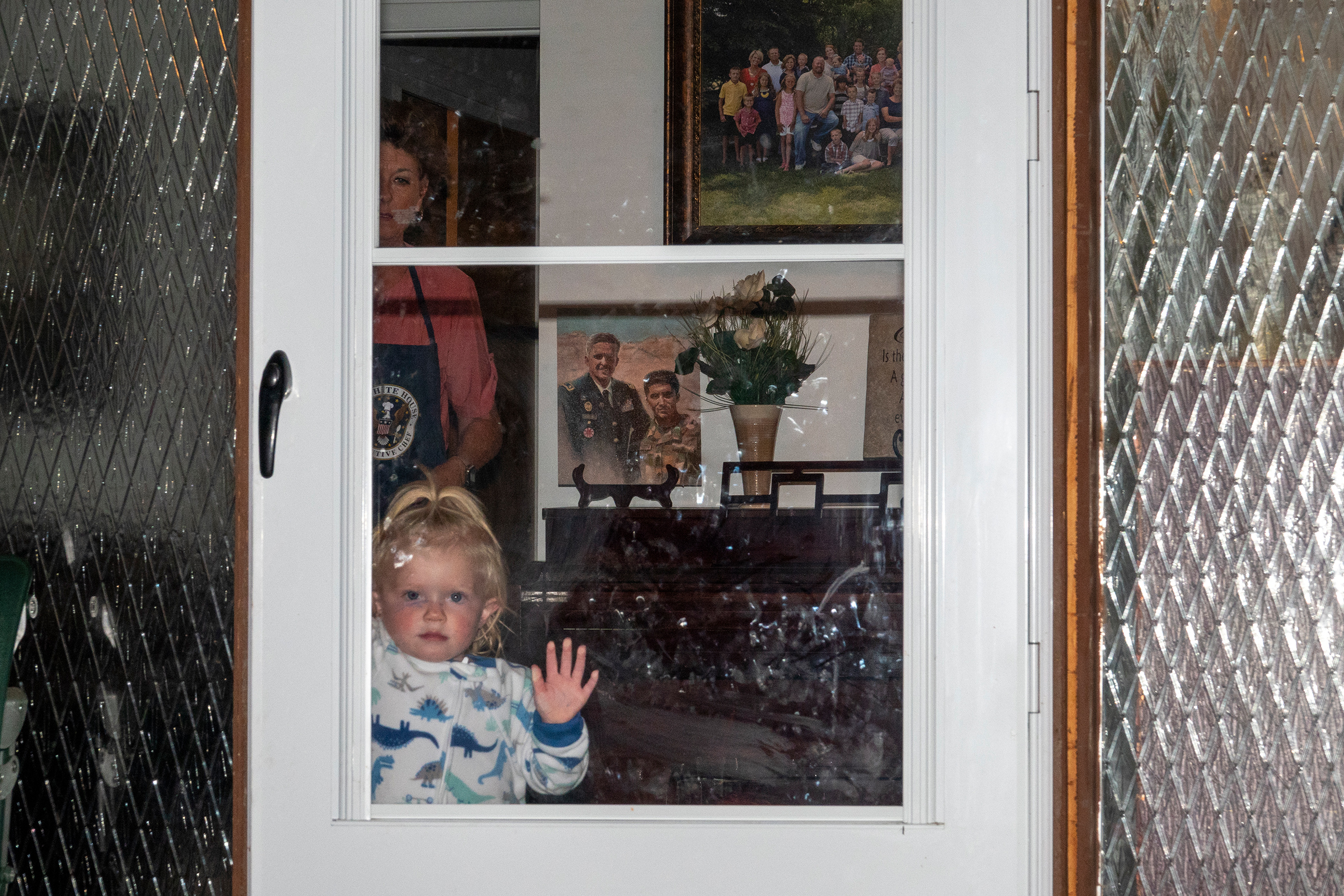
Jennie Taylor walks through the moonlit cemetery, past gray tombstones, faded bouquets and left-behind remembrances until she comes to her husband’s grave. Nearly a year has passed since Brent was killed in Afghanistan on his fourth combat deployment. She kneels in the damp grass and begins to cry. Tomorrow will be their 16th wedding anniversary, her first without him.
A single gunshot took the father of her seven children, the mayor of her hometown and a decorated major in the Utah Army National Guard. At times, she believes she’s overcome the worst of the pain. But then there are other times, like tonight, when her heart feels as if it has been wrenched from her chest.
The evening breeze blows strands of Jennie’s red hair onto her wet cheeks. She’s brought with her a collection of photographs: joyful moments from their wedding day; military promotion ceremonies; events with their smiling blond kids. She reminds herself those happy days weren’t that long ago. But she’s caught in a grim reality. “I’ve been waiting for things to return to normal, but in my heart I know that’s not going to happen,” Jennie says. “I can move on and have a beautiful future for the next 10 to 20 years, but this is still going to be part of my life. Brent is gone.”
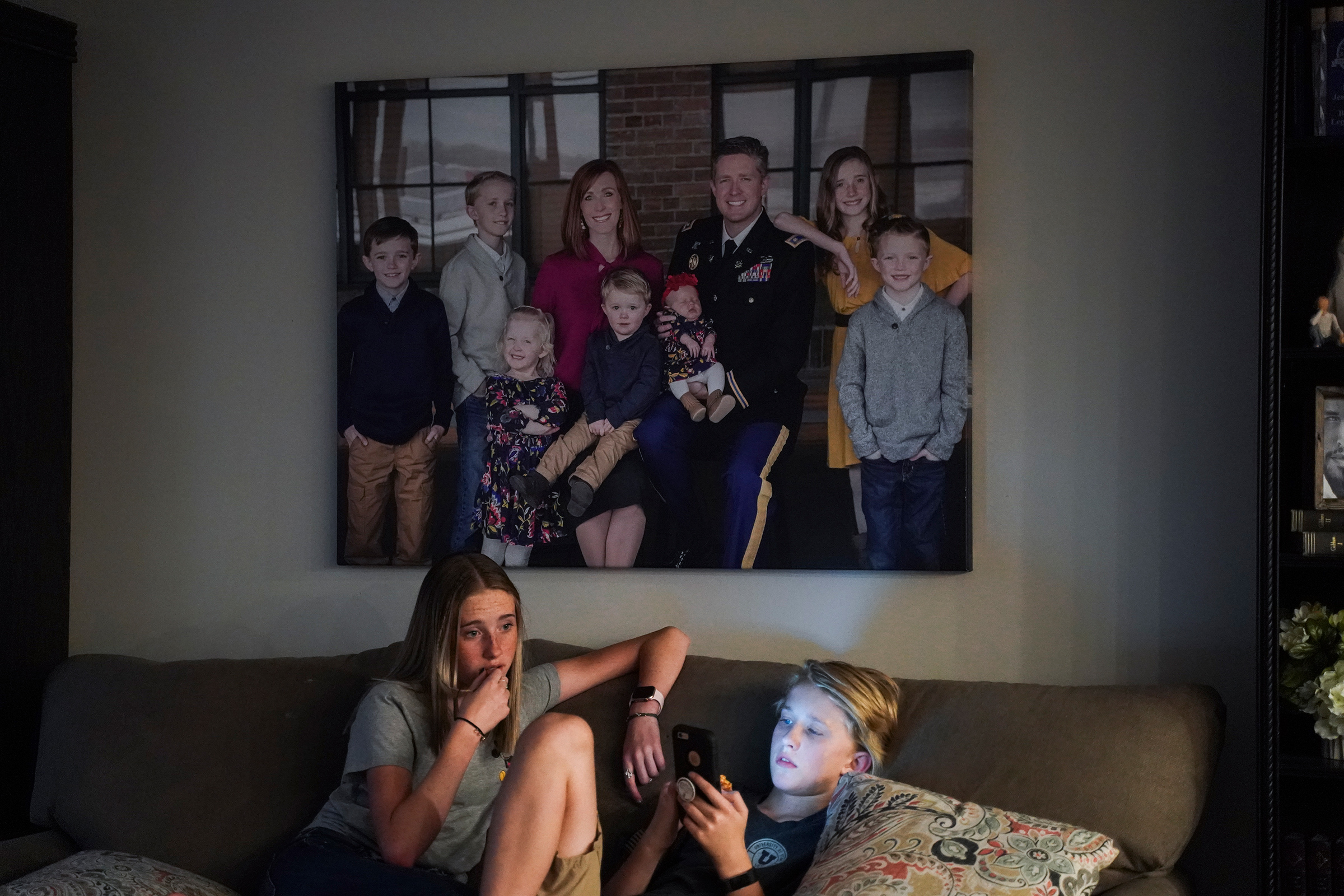
In an instant, Jennie and her family joined tens of thousands of others who have lost a loved one in combat, an unseen society that no one wants to join or ever fully identify with. Who envisions themselves a widow at 39 years old? How can you accept that you’ll never again see the man you built your life with? And how do you tell seven children their dad is dead?
Facing those questions over the past 11 months has changed Jennie. Her adult life had been defined by Brent’s involvement in America’s forever wars, but she herself had been removed from it. Brent enlisted in the Utah National Guard in June 2003, three days after he proposed to her. In the years that followed, he was sent to bases around the country for training missions ahead of his tours in Iraq and Afghanistan. He regularly missed holidays, anniversaries, birthdays and key milestones like their children’s first words and first steps.
Jennie, a former schoolteacher, was responsible for their home life. While Brent was on the other side of the globe, her world in North Ogden was small. “I was always a side player in this wonderful man’s life and gave him constant support, but now it’s entirely up to me,” she says. “When he died, every future goal of mine died. I’m sure every feminist would hate me for saying that, but it’s true. Now I’m trying to find who I am and how I move on a path forward for my family.”

While the rest of America has remained distant from the 18-year-old war that stole her husband, she has been drawn closer to it. It is now a central part of her life. Since Brent’s death, Jennie has sought out the soldiers with whom Brent fought and other families who have lost someone to war. She works on causes that show how the brunt of today’s conflict is borne by a few American military families and small communities. There are 14,000 American troops in Afghanistan now, down from about 100,000 in 2011. An average of two American troops die there each month. But if you aren’t in the military or don’t have a family member in the military, today’s conflicts have little impact on your life.
She’s launched efforts inside North Ogden to ensure that Brent’s legacy as mayor stays alive by throwing her political support behind a successor who’s committed to continuing Brent’s pro-business initiatives, which often rankled community elders. She’s also dedicated to seeing that some good ultimately comes from the bloody, and seemingly endless, American wars abroad. She has launched a foundation in Brent’s name that helps widows and military families; she’s raising $60,000 for a gold-star family memorial in North Ogden and another in Salt Lake City; she’s spearheaded a blood drive, aims to sponsor a 5K race next year and perhaps coordinate a golf tournament; she attends and speaks at events around the country. “I don’t have any education that qualifies me to lead these causes,” she says. “But I feel a responsibility to celebrate those who not only die for our country but are willing to sacrifice on behalf of this country.”
She has learned things along the way. Her experience with the military system that serves surviving families, for example, has been mixed. Getting widows’ benefits has been a challenge, and the government can be brusque. The Army still hasn’t told Jennie exactly what happened to Brent. All she knows is that an Afghan soldier, someone Brent was trying to help, shot him in the back of head during a routine march on base near Kabul, the Afghan capital. She doesn’t know who the killer is, how he pulled off the attack, what drove him to do it or whether anything has been done to prevent its happening again. She’s been told an investigation is in its final stages, but her questions keep piling up.
Then there are the more immediate needs of her seven children, who range from 1 year to 14 years old. When they wake up at 6 a.m., Jennie’s “reality show” begins. Seven breakfasts to be made. Seven sets of teeth that need brushing. They’ll need a ride to school. They’ll need to be picked up. They’ll need a cooler full of sports drinks for flag football and cheer practice. They’ll need a ride there too. Laundry. Dinner. Baths. The routine repeats. There are no days off.
Many people in North Ogden, a mountain-ringed middle-class suburb of nearly 20,000 north of Salt Lake City, have helped. Brent was elected to the city council here in 2009, and became mayor in 2013. He won re-election in 2017. Neighbors in the largely Mormon community bring the family dinner every Tuesday and help with the children when they can.
The only time Jennie has to herself is at night. That’s when she slips out of the house to be alone with Brent. It is nearly midnight when Jennie turns to leave the cemetery, the moon hanging between two peaks in the nearby Wasatch Range. Her alarm clock will go off in six hours, but one of the kids will nudge her awake first.

Jennie wasn’t home on the cloudy November morning when two uniformed soldiers walked up her driveway toward their brown brick home. It was a Saturday and she was visiting college friends from Brigham Young University in Provo. Her mother Kristin was watching the children, so when the soldiers appeared in the doorway, she called Jennie’s cell phone. But the soldiers couldn’t tell her anything. Protocol demanded they speak to Jennie in person. She would have to travel 30 miles north to Utah National Guard headquarters in Draper to find out the news.
Jennie tried to handle the situation. Maybe he was injured. Maybe he was paralyzed. Maybe he was handicapped. She couldn’t breathe, let alone drive. Her former roommate offered to take her, and as the landscape rushed by at 70 m.p.h., Jennie tried to focus her thoughts by scribbling them down in orange pen: “If he is dead, I have to process this.” She wrote directly under it: “I don’t have a choice. I can’t fall apart. My kids matter most.”
When she got to the long single-story headquarters building, two soldiers were holding the glass doors open for her. As she stepped inside and her eyes adjusted to the darkness, she saw another soldier standing stiffly at the next door. When she walked further inside, she realized that each door in the narrow hallway—perhaps a dozen or more—had a soldier posted in front of it. “And none of them would look at me,” Jennie recalls, tears welling up in her blue eyes. “That’s when I knew for sure he was dead.”

She sat inside a cramped cream-colored conference room. The two officers told her the details were murky, but it was known that Brent and another U.S. soldier were shot on Nov. 3, 2018, by one of the Afghan troops they were training during a routine hike near Camp Scorpion in Kabul, where Brent was based. Other Afghan troops in the unit had quickly drawn their guns and shot the killer dead. It was the fifth “insider attack” in four months, and the motives behind it remain unknown. Brent was evacuated to nearby Bagram Airfield and died during the short helicopter ride. The six-page military autopsy report, observed by TIME, contains grim details. The attacker shot Brent in the back of the head above his right ear; the bullet tore through his brain before exiting the left side of his forehead. The motive remains unknown.
Later that day, the military issued a typically bland statement that an unidentified service member had been killed in Afghanistan, with the usual disclaimer that additional information would become public 24 hours after family notification. However, it didn’t take long for news of Brent’s death to spread through North Ogden. Jennie hurried home to tell her children before the news reached them. It would be the most difficult thing she would ever do.
The kids had gone out for McDonald’s with Jennie’s stepfather and brother, and they happened to pull up to the house at the same time Jennie did. They followed her into the house and down the carpeted stairway into the ground-floor living room: Megan, 13; Lincoln, 11; Alex, 9; Jacob, 7; Ellie, 5; Jonathan, 2; and Caroline, 11 months. Sitting around a leather sectional couch, they learned their father was dead. Seven sets of eyes looked back at Jennie in disbelief. As the news sank in, Jennie tried to embrace each of them to acknowledge each child’s grief. “It was hard because I’m not an octopus,” she says. “I don’t have seven arms to hug them all.”
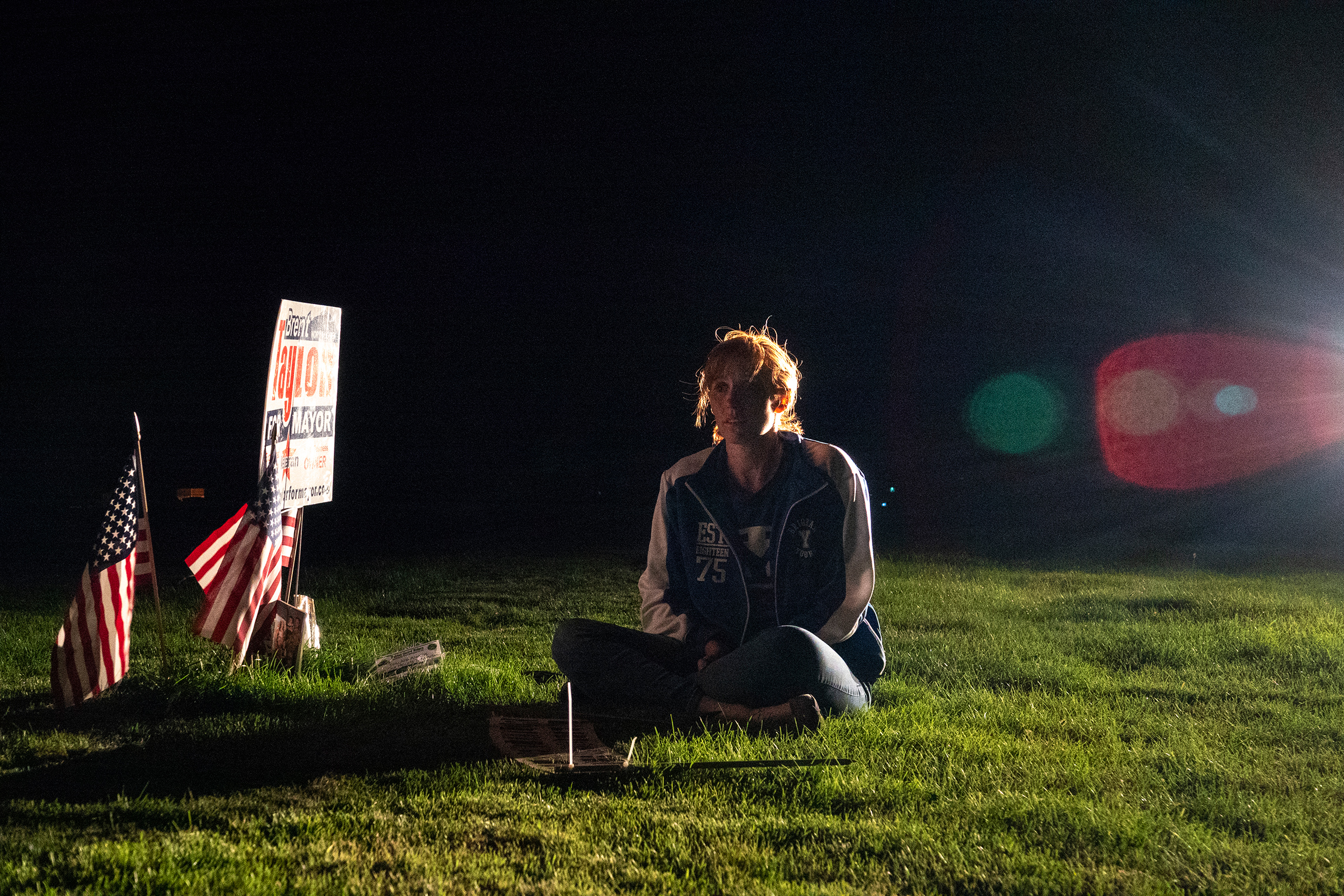
Three days after Brent was killed, his remains arrived on a hulking C-17 jet at Dover Air Force Base in the predawn mist at 4 a.m. Jennie and two of her kids looked on as six soldiers with white gloves carried the flag-draped transfer case off the back of the plane. Jennie later put on a brave face and stood before cameras to give a short statement. “To call it a sobering event would be an unspeakable understatement,” she said, looking on blankly in a navy blue pea coat. “To say that our hearts are anything but shattered would be nothing short of true deceit. And yet, to deny the sacred honor that it is to stand that close to some of the freshest blood that has been spilt for our country would be absolute blasphemy.”
She spoke with Army Major Travis Reinold, who had traveled with Brent’s remains alone in the C-17’s cavernous cargo hold from Afghanistan. He did not witness Brent’s death, but had served the past three months with him. The two of them were part of a 10-officer team attached to the Army’s elite 75th Ranger Regiment. Their job was to train Afghan commandos so they could work with American special operators on raid missions. It was supposed to be a safe assignment.
Reinold told Jennie how much the other officers respected Brent. He told her how everyone on base knew him because his salt-and-pepper hair contrasted with that of the younger soldiers and Afghans. He told her that Afghans respected Brent because he spent time with them in their camps. Jennie knew this was true. Major Abdul Rahman Rahmani, an Afghan Army helicopter pilot, posted a letter on Twitter addressed to Jennie that outlined his admiration for Brent, whom he called a “compassionate man whose life was not just meaningful, it was inspirational.”

Over the next six days, the mortuary team at Dover prepared Brent for burial. They washed his hair, cleaned his wounds and dressed him in his blue Class A uniform. They pinned a golden oak leaf to each of his shoulders, indicating his rank as major, and more than a dozen medals and ribbons to the left side of his chest, including a Bronze Star; a Purple Heart; and a Combat Action Badge, a two-inch silver pin featuring a bayonet wrapped in an oak wreath. The meticulous process is carried out whether or not anyone decides to view the body. Jennie’s family did not.
Brent’s remains landed at Roland R. Wright Air National Guard Base in Salt Lake City on Nov. 14. Six troops transferred the flag-draped casket to a white hearse, and more than two dozen law-enforcement officers on motorcycles fell into formation behind it as it drove the 46 miles north to North Ogden on Interstate 15. Drivers yielded out of respect and people lined the roads and looked on from overpasses. Jennie, trailing the hearse in a white van with the rest of the family, felt like she was watching the funeral procession from outside her body. “It was like a movie,” she says. “People were everywhere: kids, flags, adults. Everywhere.”
In North Ogden, hundreds of residents stood in the cold for more than an hour along both sides of Washington Boulevard to see the mayor’s return. When the hearse rolled past, there was silence, except for the rumble of motors from police vehicles and the flapping of American flags.
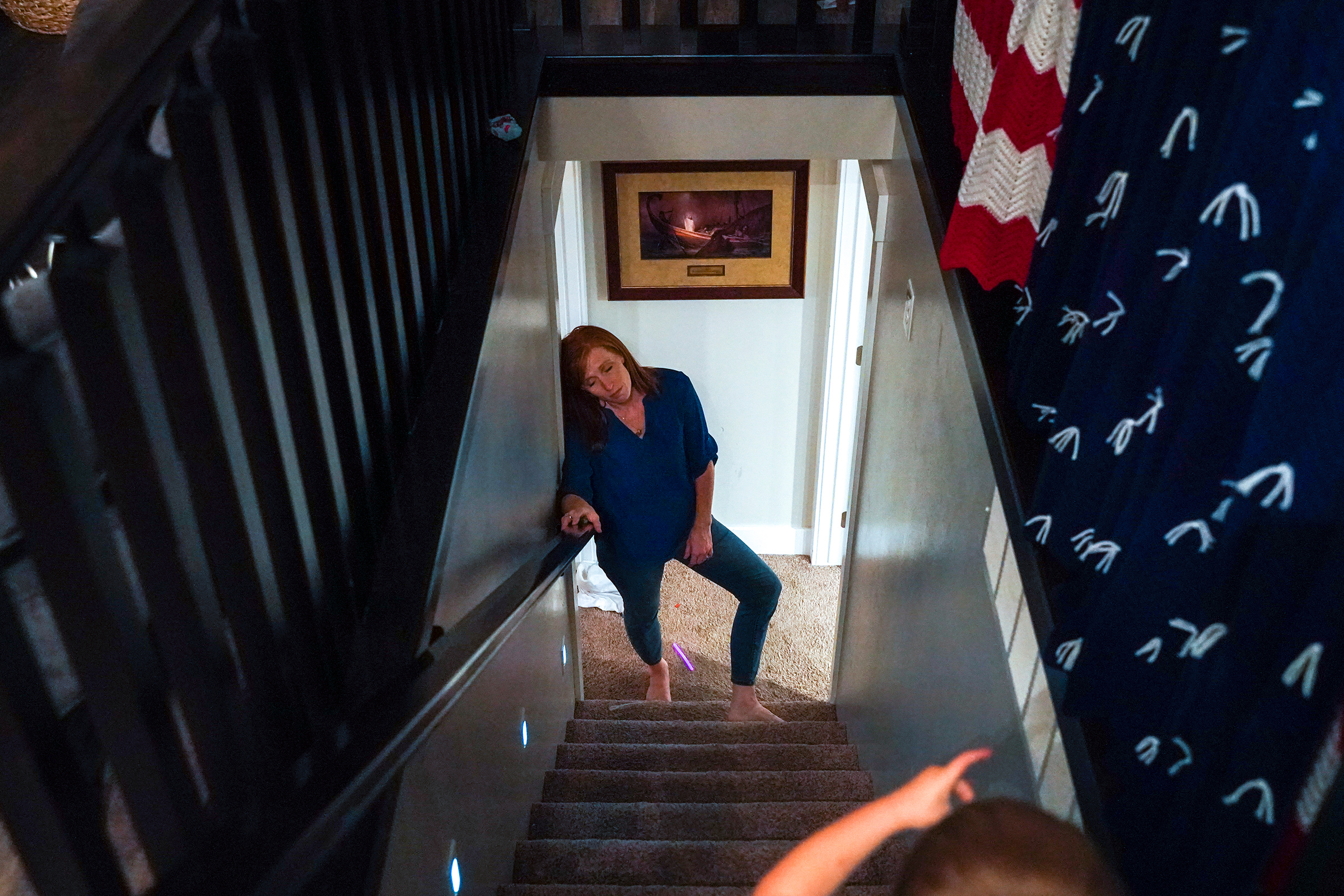
There are rosebushes in the Taylors’ front yard, a picturesque swirl of pink, white and magenta. But when they first began to bud this past springtime, Jennie despised them. “I felt like nature was mocking me,” she says. Brent had planted them there.
One of the most difficult parts of Brent’s death was how to deal with the things he left behind. It wasn’t just the shoes, shirts, pants, suits, hats, underwear, uniforms and coats in closets and drawers. It was that he had left them on hooks on the bedroom door and by the front door. He was coming back in January—except he didn’t.
Jennie couldn’t muster the strength to go through each of these items by hand. His clothes smelled like him. His shoes still had dirt in the treads from their garden. The other thing was that people from around the country who had seen her story on nightly newscasts were sending her things: a throw pillow with Brent’s face embroidered in the middle, a teddy bear in Army fatigues, a velvet blanket with an American flag that featured each family member’s name on the stripes.
One day, Jennie decided it all had to go. So one Tuesday morning, while she was at a political event, a group of women from the neighborhood came and spent several hours placing everything in more than a dozen black storage containers and carrying them into a shed in the backyard. “She needed to reclaim her life without swimming in mementos every day,” says Kristy Pack, Jennie’s younger sister, who lives about a mile away.
But eliminating all of the reminders is impossible. Every day, Jennie drives the kids to school down Washington Boulevard, the street where Brent’s body returned home, past the Maverik gas station, one of the businesses Brent had helped lure to North Ogden, and past a pennant with Brent’s smiling face that hangs on a streetlight Brent helped install as part of his town “beautification program.”
The family’s ranch house was entirely Brent’s idea. It’s built on an acre and a half of land that stretches like a big green blanket outside the back door. “He had a crazy idea that we could turn it into a farm,” Jennie says, smiling. “He didn’t grow up on a farm or anything, but he thought it would be a good idea for the kids to learn the virtues of manual labor.”
They planted peaches, plums, pears, apples, apricots, hot peppers, sweet peppers, green beans, squash, tomatoes and even raised 19 chickens in a coop. It was all irrigated through an elaborate system of 150 ft. of water hoses and diverters that Brent engineered. But in his absence, the farm has faded. The fruit lays in heaps under 41 hunched-over trees. The pink and black water hoses sit coiled in a pile. The chicken coops are empty. Weeds compete with the fruit and berry plants. Jennie is unsure about what to do with the land. “It’s really sad,” she says, picking a plump yellow peach from a sagging branch. “But it’s hard to find the time or energy to take care of everything.”
She helps the children deal with the grief as best she can. She looks for signs of pain. Her own father committed suicide when she was 10 years old, so she knows what it’s like to live with loss. Money is a constant concern. Jennie stopped teaching high school 15 years ago, so she and the kids depended on Brent’s modest government salary to get by. She received a lump sum of $400,000 from life insurance and gets monthly payments in veterans’ and survivors’ benefits. “It’s enough for now,” she says.

Charity has made a big difference. Someone started a GoFundMe account that raised $500,000 for her family. The nonprofit Stephen Siller Tunnel to Towers Foundation paid off the remaining $250,000 balance on her mortgage. An anonymous donor contacted a local car dealer and gave the family a new metallic gold Chevrolet Suburban. A man from Florida cut the family a check for $10,000. And last Christmas, the children received truckloads of toys from people across the country. Jennie is grateful. She wrote 300 Christmas cards responding to every letter that had a return address. And the money has made it possible to buy school supplies, clothes and groceries. “I thank God every day for what’s been given to us,” she says. “We’re not the only family to suffer tragedy in this country or in Afghanistan, for that matter, where innocent people die every day.”
She is looking for ways to repay the debt. On a recent Tuesday, she dropped the children at school, then attended a business meeting about her foundation and Follow the Flag, another nonprofit that raises awareness of veterans’ issues. After that, she visited a local monument-maker to begin planning for North Ogden’s gold-star memorial and to look at options for Brent’s headstone, which she will share with him one day. In between, she took a phone call with Lynn Satterthwaite, a former North Ogden city-council member who is running for North Ogden mayor. The local politician Brent had asked to serve as acting mayor while he deployed, Brent Chugg, isn’t running.
Jennie is concerned about whether Brent’s legacy is represented on the ballot. The initiatives he spearheaded—like business expansion, the town beautification program and construction plans around the local amphitheater—will likely be abandoned if an ally doesn’t see them through. She believes Satterthwaite will champion those efforts. “This is an older community that struggles with change,” she says.
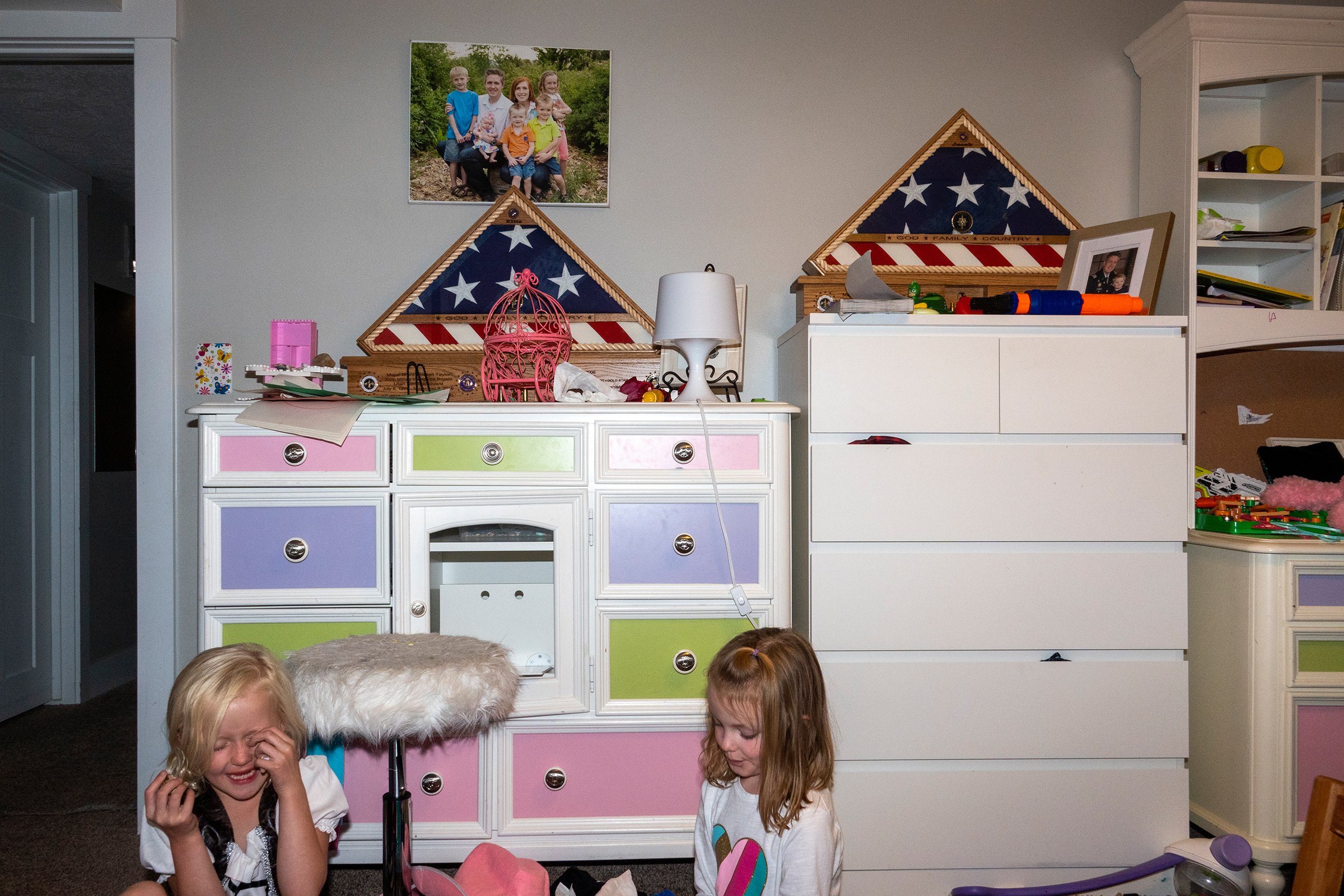
The day before her anniversary, Jennie gets home after her errands, just before the kids return from school. Within minutes, the living room is a mess of discarded clothes and mandarin-orange peels, the kitchen table covered with homework and books. An hour later, Jennie is out the door on a grocery run to purchase more oranges, Cheez-Its and fruit snacks for Megan’s cheer practice; Gatorades and brownies for Alex’s flag-football game; and a costume for Ellie, who has “Pirate Day” the next day at school.
After the football game, she wrangles the kids for the nightly prayer before bed. They change into their pajamas, brush their teeth and retreat to their beds. Then the youngest children decide they also want a lullaby. Jennie steps into their darkened room and sings a Mormon hymn. Her voice carries down the hallway through the open bedroom door:
For the temple is a holy place
Where we are sealed together.
As a child of God, I’ve learned this truth:
A family is forever.
More Must-Reads from TIME
- Cybersecurity Experts Are Sounding the Alarm on DOGE
- Meet the 2025 Women of the Year
- The Harsh Truth About Disability Inclusion
- Why Do More Young Adults Have Cancer?
- Colman Domingo Leads With Radical Love
- How to Get Better at Doing Things Alone
- Michelle Zauner Stares Down the Darkness
Write to W.J. Hennigan/North Ogden at william.hennigan@time.com